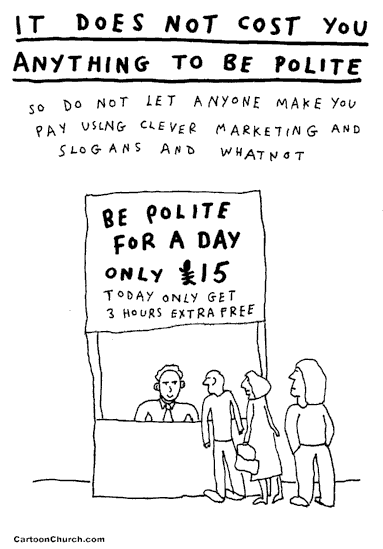Word-Of-the-Week #992: Polite
August 10, 2023 by Susan Clarke · Comments Off on Word-Of-the-Week #992: Polite
Polite – mindful of, conforming to, or marked by good manners.
How does it feel when you are mindful of someone else and show good manners? How does it feel when people treat you politely?
This week features the 2nd half of “If someone uses these 7 phrases, they’re only pretending to be polite,” by Tina Fey at HackSpirit.
“Have you ever left a conversation feeling vaguely uncomfortable?
On paper, there was nothing wrong with the conversation. In fact, everything they said was very nice and polite.
So what’s going on here? Are you overthinking things when there’s no real issue?
Or maybe you’re picking up on someone who’s only pretending to be polite.
How can you tell if that’s the case? After analyzing the people I know and interactions I had with them, I’ve narrowed it down to 7 key phrases.
If you notice someone using these a lot, there’s a good chance they’re only pretending to be polite.
1) “No offense, but…”
We’ve all heard this phrase. It’s a classic, typically used when someone is about to say something that they already know might offend you. Despite the preface, it’s rarely used in genuinely polite conversation.
A person using “no offense, but…” is, in effect, giving themselves a free pass to make a potentially insulting comment.
They’re acknowledging that their words might upset you, but instead of putting in effort to find a more compassionate way to say it, they’ve decided to say it anyway.
The irony of this phrase is hard to ignore. By claiming not to intend offense, the speaker shifts responsibility for any hurt feelings onto the listener, as if it were your fault for taking offense.
I heard this quite a lot in a recent online course I was a part of. During peer review, one member would start his sentences with “No offense, but..” and then he would give a rather harsh critique to another participant’s project.
It was rather uncomfortable for anyone involved. If you find yourself tempted to use this phrase, it’s a sign that there could be a kinder way to say what you want to say.
2) “I’m sorry you feel that way”
Ah, the pseudo-apology.
On the surface, it seems like an attempt at empathy and understanding. But in reality, “I’m sorry you feel that way” is often a veiled attempt at deflecting blame and responsibility.
Instead of offering a genuine apology for their actions, the person is merely expressing regret over your emotional response. It’s a subtle shift, but it places the responsibility of the conflict onto the receiver, not the issuer of the statement.
Basically, they’re saying, “I’m sorry that you’re upset,” not, “I’m sorry for what I did to upset you.” In other words, this phrasing suggests that the real problem is your feelins, not their actions.
At my previous job, I had a situation with a co-worker where we disagreed on a project approach. When I expressed my concerns over his method, his response was, “I’m sorry you feel that way.”
That phrase did nothing to address the issue at hand. Instead, it left me feeling dismissed and unheard.
Remember, genuine politeness means listening, empathizing, and when necessary, owning up to our actions.
3) “Do you need any help?”
And now we come to the fake offer for help.
You’ve surely heard this from a seemingly nice passerby or stranger. I witnessed it just a few days ago in a grocery store parking lot.
A woman’s bags ripped and all the contents of it spilled onto the ground. A young man walking by asked, “Do you need any help?”
So here’s why this is often just someone pretending to be polite. The way it’s phrased practically encourages the person to politely decline.
Saying yes would make them feel like they’re inconveniencing the person asking, or having to admit that they need help, which can make them uncomfortable.
And in fact, the woman in the parking lot answered with “Oh I’m fine, thank you.”
A genuinely kind offer would sound like “May I help you?” or “Please let me help you.” Or, you would simply help without even asking — it’s pretty obvious the person could use a hand.
4) “Bless your heart”
Here’s a phrase that’s very popular especially in the south of the US.
While it can be a genuine term of sympathy or endearment, it’s often used as a passive-aggressive insult, typically when the speaker believes the person they’re addressing has done something foolish or naive.
Instead of directly stating their disapproval or disbelief, the speaker sugarcoats their criticism with this seemingly kind phrase. It’s polite mockery masquerading as concern.
Last year, during a family reunion, I suggested a new way to organize our yearly holiday gift exchange.
An elder cousin responded with a sweet smile, “Bless your heart, always trying to fix things that aren’t broken.”
At that moment, the phrase wasn’t a compliment to my initiative but a polite jab at my perceived naivety. It left an undercurrent of negativity beneath the polite veneer.
So remember, politeness isn’t just about the words we use but also the intent behind them. Truly polite people use their words to uplift others, not to subtly bring them down.
This week is all about being polite. Are you a good listener? How easy is it for you to feel empathy for someone? Are the words you choose uplifting to others?
I LOVE feedback! Join my Facebook community on my FUN-damentals Fan Page.
WOW Word-Of-the-Week #386: Polite
December 28, 2011 by Susan Clarke · Comments Off on WOW Word-Of-the-Week #386: Polite
Polite – mindful of, conforming to, or marked by good manners.
Where you taught manners by your parents? Do you have to remind your children or grand-children to say please and thank you? How about your staff or co-workers? When someone gives you a compliment you do you say thank you? Or do you dismiss it as “no big deal?”
When I was a small child I remember having a record that I played over and over. The only lyrics I remember are these, “There are two little magic words that will open any door with ease, the first little word is Thanks and the other little word is Please.”
Two WOW’s this month have been about appreciation and Thank You! This is the time you can set a good example for your family, friends, staff and/or co-workers. Now that the gift buying and giving is over, it is time to sit down and write a thank you to those people. My feeling is this: If someone took the time and consideration to get you a gift, then you should take the time to let them know how much you appreciate it. It is just good manners!
If you’ve never sent a thank you, my biggest piece of advice is this: “You don’t have to write a book.” Two or three sentences is all it takes! And don’t procrastinate! Do it today!
This week I want you to focus on being polite. How does it feel when you are mindful of someone else and show good manners? How does it feel when people treat you politely? How would it feel to start a new tradition and write your thank you’s together as a “family?”
Reader Responses
“I just looked at this email after having talked to my mother in Florida. She usually sends gifts to the grandchildren (including my daughters) for Christmas. Outside of my girls, none of the other grandchildren sent my parents a Christmas card, let alone a thank you note for the gifts. My wife lines up the people to send thank you notes to after the holidays. I make sure that they get mailed. It is COMMON COURTESY. It says a lot about the person who takes time out of his or her day to choose an appropriate card, sit down and then mail out a card. The fact that a person thought that much to take the time to say thank you shows he or she cares. We are moving so fast today that we have lost basic politeness. Since my wife and I make it a point to have our daughters do this on a regular basis, we are sending a message by our example. Last week I could not use tickets for a basketball game and called a fellow alum to find out if he wanted the tickets. This man is a dentist who is doing very well. I never received a phone call, let alone a thank you note from him. Not even an acknowledgement that he enjoyed the game with his family or friends. I guess these are the times we live in, but we must continue to set the example for future generations. Thank you for the word, Susan. You are on top of it. Have a wonderful weekend.” – “Warrior” Joe
“”Excellent message – in this day of over-communication, thank you’s seem to have gotten lost. THANK YOU FOR THIS POST!” – Dave


